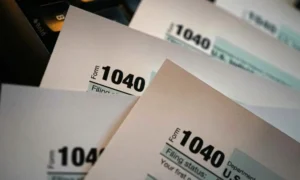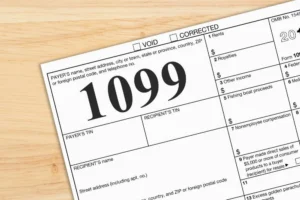Most business owners are concerned with one thing: Making a profit. A second thing to worry about, though, is keeping the IRS happy. No one wants to be on the wrong side of that equation. That means knowing some obscure tax provisions – such as the requirement to report large cash payments on Form 8300. The IRS requires all businesses to file the form for every cash payment they receive of $10,000 or more. The payment can be acquired in one lump sum or several related transactions. The IRS also requires the company to notify each customer listed on the form about the filing.
Form 8300 is an informational filing, which means it is for reporting purposes only. The IRS just wants you to let them know if your business gets a large cash payment. The government created this form as a component of the currency reporting management system of the Bank Secrecy Act to help the IRS and the Financial Crimes Enforcement Network (FinCEN) combat money laundering. It is often the impetus for audits, especially in legally gray businesses such as cannabis dispensaries.
Read on to learn what this requirement is, when you must file it, what happens if you don’t, and some pitfalls to avoid.
Filing Options, Deadlines, and Requirements

Companies can file Form 8300 by mail or electronically by the imposed deadline. They should send the customer statements around the same time as they file, but there is a deadline. It is imperative to follow every guideline to ensure the filing is successful and avoid an audit. These include:
Filing Options
Companies can mail a paper copy of the form to the IRS at Detroit Computing Center, P.O. Box 32621, Detroit, MI 48232. Make sure to keep a copy for your records. They can also file electronically using the FinCEN E-Filing System. You must first register your business on the system before you can file. This is the same system used to file FBARs, or Foreign Bank Account Reports, for individual people and businesses holding foreign bank accounts.
Deadlines
Companies must file within 15 days after receiving a cash payment of $10,000 or more. Should that day fall on a weekend or a holiday, it’s acceptable to file the next business day. The deadline for customer statements is on or before the last day of January in the calendar year after the year of the cash payment.
Statement Requirements
The requirement for companies to send a statement to each customer named includes the phone number and address of the business, a contact person, the collective amount of reportable income received, and confirmation of sending the form to the IRS.
Documentation Requirements
Filing Form 8300 requires some documentation. You’ll need the I.D. of the customer who made the payment, completed W-9s for the customer, and identification of all bills of $100 or higher.
Deadlines are one of the most critical factors in filing this form. There are also a few other things to keep in mind before and after you file.
Essential Factors of Filing Form 8300

The majority of IRS requirements are less than crystal clear, and Form 8300 is no different. Here are a few things to keep in mind before and after filing it:
1. Definition of a “Person”
The IRS language is notoriously confusing. The form uses the term “person” to mean any trust, partnership, estate, company, business, individual, or corporation.
2. Definition of a “Transaction”
A transaction means the sale of goods, services, and real properties, but also intangible objects, payment of debt, currency conversion, and reimbursement of expenses.
3. What the IRS Means by “Cash”
The word “cash,” for purposes of this requirement, means any U.S. bill or coin, as well as any foreign currency. It also means any cashier’s check, money order, traveler’s check, or bank draft involved in a designated reporting transaction.
4. Exceptions to Filing IRS Form 8300
There are two exceptions to filing the form. The first is overseas financial institutions and transactions that take place abroad. Such financial institutions must file a Currency Transaction Report (CTR) instead. Most government entities are also exempt from filing, except criminal court. A criminal court clerk must file the form if a cash bail over $10,000 is made for an individual who has committed a federal crime involving drugs, money laundering, or racketeering.
5. Civil and Criminal Penalties
Failing to file results in penalties. If the failure to file was just an oversight, a $250 fee for each occurrence is required. Intentionally failing to file results in a fine of $25,000 to $100,000, depending upon the amount of the reporting transaction. Those who intentionally don’t file can face up to a year of incarceration.
Mistakes happen, but when they occur in dealings with the IRS, they cost you money and time – and sometimes even your freedom. Be aware of the common mistakes in filing Form 8300 to make sure you keep up with this obligation. Anyone unsure of the requirements should consult with a tax attorney.
Common Mistakes

It is still possible to make a costly mistake, no matter how well you prepare. Stay one step ahead and consider these common mistakes before you file Form 8300:
- Don’t miss the deadline, or you will incur monetary penalties.
- Set aside enough time to fill out the form thoroughly, including all payments that meet the requirement.
- Double-check all your numbers and info before submitting. It’s easy to misplace numbers and decimal points, and such an error could lead to an audit.
Filing IRS forms is never a pleasant experience, but it doesn’t have to be a nightmare. Arming yourself with as much information as possible and gathering all required documents ahead of time is your best route to success. Working with a tax attorney can also ensure that you’re following the law correctly.
How to Get Help Filing Form 8300

It’s not unusual for someone’s confidence to wane when faced with IRS regulations. Silver Tax Group has a diverse staff of experienced pros who will make sure you meet all IRS requirements while minimizing your tax obligation. We have also defended clients successfully against the IRS in numerous cases across the nation. If you’re worried about the intricacies of filing Form 8300 or any other tax issue, contact Silver Tax Group today to speak to an expert.





